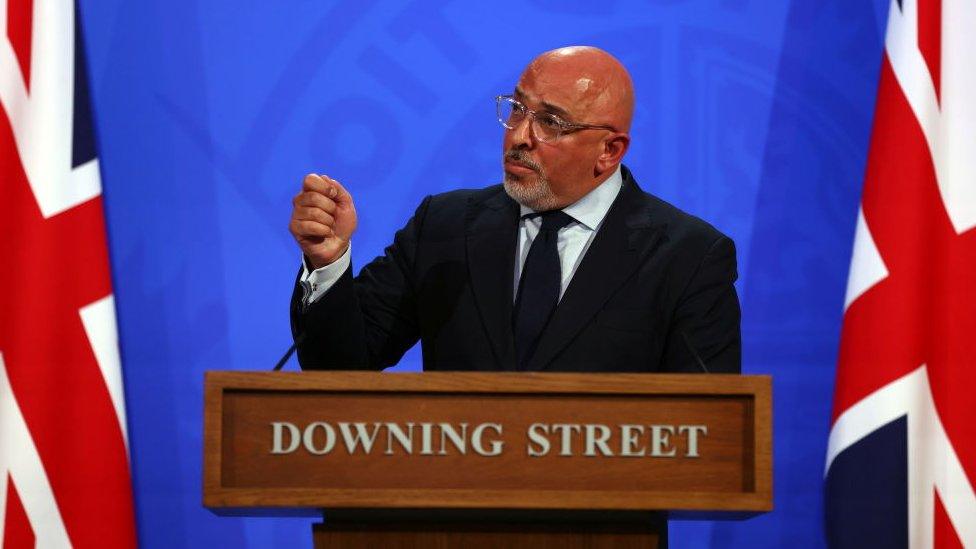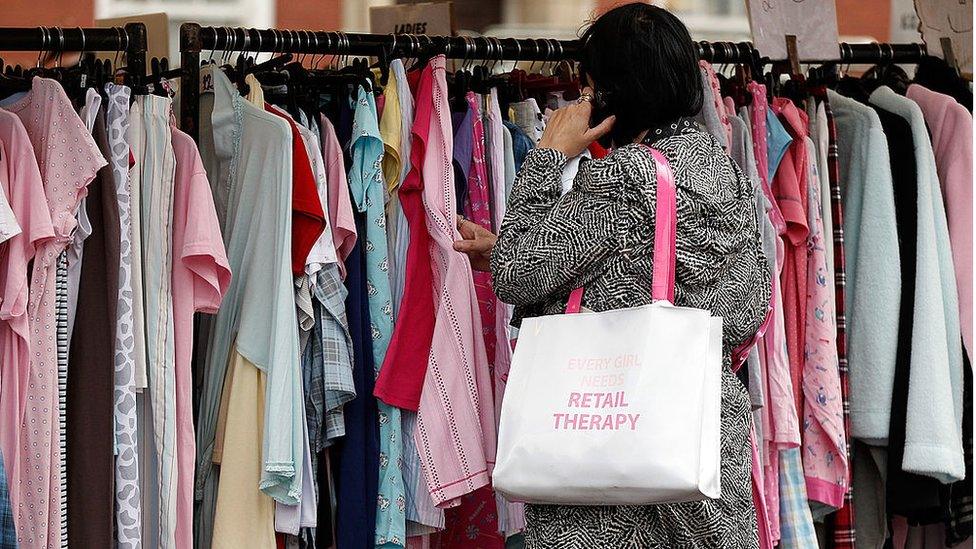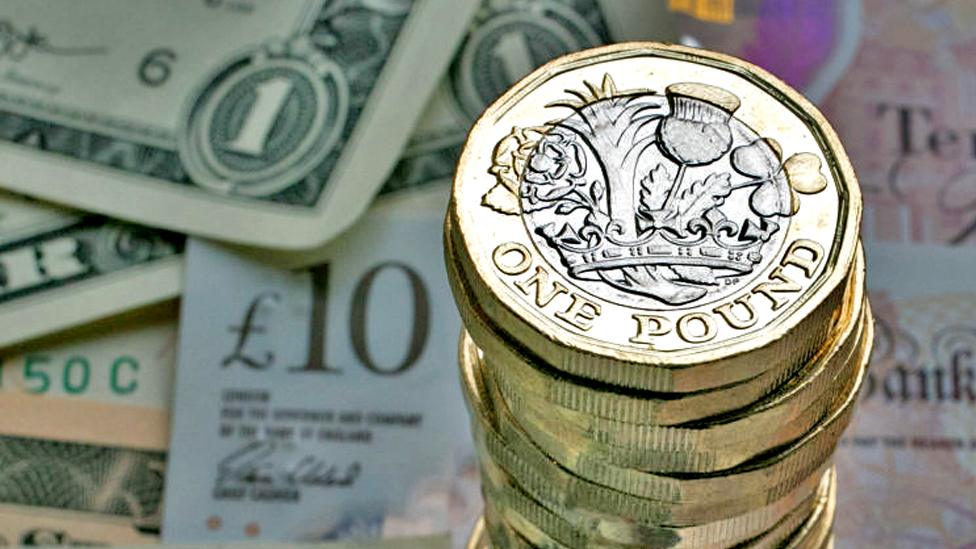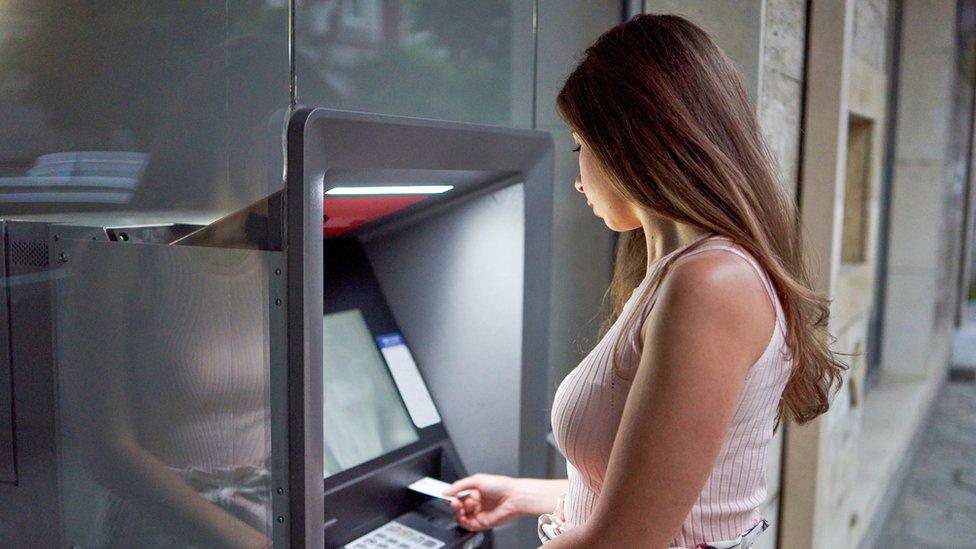Will Nadhim Zahawi change tack on the economy?
- Published

Rishi Sunak's shock resignation letter revealed clearly that his approach to the handling of the economy was "fundamentally too different" from that of the prime minister for him to stay in the government.
He acknowledged both he and the prime minister wanted a "low-tax, high-growth economy, and world class public services", but Mr Sunak said this could only be "responsibly delivered if we are prepared to work hard, make sacrifices and take difficult decisions".
He said the public needed to know that "whilst there is a path to a better future, it is not an easy one".
The former chancellor and Boris Johnson had been preparing for a joint speech on the economy next week, but during the course of those preparations Mr Sunak said it had "become clear to me that our approaches are fundamentally too different".
Now his replacement Nadhim Zahawi has said he and Prime Minister Boris Johnson want to "rebuild the economy" and get soaring inflation under control.
Mr Zahawi said "nothing is off the table" in terms of cutting taxes.
So what are some of the options open to the new Chancellor?
1. Cut VAT
Mr Zahawi has said he wants to do two things: cut taxes and "bear down" on inflation.
Those are not usually happy bedfellows. Cutting taxes puts more money into the economy, which drives prices up - so how can he walk this line?
A temporary cut in VAT - the tax paid when buying goods and services - from 20% to 17.5%, say, would lower the price of goods and services in the basket used to calculate inflation - taxes would get cut, and prices would go down.
But there would be some problems with this. The cut might not be passed on by struggling businesses.
Even if it were, the extra money in people's pockets would be chasing the same number of goods in an economy where supply is the problem, risking pushing inflation, which is already rising at its fastest rate for 40 years, up even further.
In any event, prices would just go back up again when the VAT cut was reversed.
Furthermore, cutting VAT would mostly benefit high earners, according to George Dibb, head of the Institute for Public Policy Research's Centre for Economic Justice.
"The big risk with cutting VAT is that it could be inflationary, but it would also just put more money in everyone's pockets despite families coming out of the pandemic in very different positions."
"Cutting VAT actually just benefits those on the highest incomes," Mr Dibb said. "It doesn't really help the lowest earners who are the most affected by the cost-of-living crisis."

2. Bring forward income tax cuts
Mr Zahawi could bring forward the 1p income tax cut that Rishi Sunak promised would happen in 2024. before the next election.
The Taxpayers' Alliance, a pressure group that campaigns for lower taxes, has said if the government wanted to give families "a respite from tax rises, they'd do well to simply bring forward the planned income tax cut instead of tricking taxpayers into thinking they're better off".
However, Rishi Sunak delayed that cut to the tax people pay on their income because it's quite expensive - it would cost the government around £5bn.
The move is also likely to again benefit higher earners more than anyone else, according to Lukasz Krebel, an economist at the New Economics Foundation think tank told the BBC.
"The new chancellor's priority should be to tackle the cost of living crisis and tax cuts are not the best way of doing this as they are untargeted and much of the benefits will go towards subsidising those on higher incomes," said Mr Krebel.
It would also benefit higher earners much more than lower earners, and it wouldn't slow down how quickly prices rise.

3. Cut corporation tax
Mr Zahawi has hinted that he may scrap a planned corporation tax rise due in 2023 - this is the only tax he has so far specifically mentioned. The tax on company profits is due to rise from 19% to 25% in April 2023.
In an interview with BBC Breakfast on Thursday, Mr Zahawi said: "Companies make investment decisions over the long term. One of the taxes they can compare globally is corporation tax, and I want to take a very careful look at all the measures that I can bring to bear, to bear down on inflation but also return to that dynamic economy that delivers growth."
In March 2020 the Treasury expected the tax to raise an extra £12bn next year, rising to £17bn in 2026.
That now looks optimistic as company profits are squeezed by higher costs and lower consumer demand.
Reversing some of it would not be that expensive, and would send a pro-business, pro-growth, traditionally conservative message.
Some Conservative MPs fear that increasing the tax will discourage foreign investment in the UK, which has fallen since the country voted to leave the EU. Historically, the amount of money raised by corporation tax has increased even as the rate declined.
But according to Mr Dibb, at the left-leaning IPPR think tank, abandoning the proposed rise in corporation tax will do nothing to stimulate the economy.
"The problem with cutting corporation tax is it won't do what Mr Zahawi wants it to do," he said. "Cutting it doesn't increase private sector investment. It is a cash handout to companies."
"We need a proper industrial strategy. Firms don't invest because they get tax cuts, they invest because they see future growth opportunities."
Mr Dibb said that recent figures showed that private sector investment had fallen in the previous quarter, despite corporation tax cuts implemented by the former chancellor Rishi Sunak.
This sentiment was echoed by Mr Krebel, from the New Economics Foundation who said that "cutting corporation taxes would be a costly measure but unlikely to offer much of economic boost, since business growth ultimately depends on strong demand in the economy."
So if cutting taxes while lowering inflation is a tough trick to pull off, what are some of the other options Mr Zahawi has at his disposal to ease the burden?

4. More government support
Low-income households will soon start to get government payments to help with the cost of living, and particularly their winter energy bills.
Will the new chancellor consider extending direct assistance for households?
Direct payments are unusual - certainly for a Conservative government - but these are unusual times.
Cost-of-living payments serve a dual purpose of being popular and comparatively easy to administer.
Next week, low-income households on means-tested benefits will receive the first instalment of financial support straight into their bank accounts.
Adding more payments during a tough winter ahead would allow people to spend the money quickly on the things that really matter - heating, eating and getting around.
However, direct payments are short-term by nature - unlike change to tax rises - and they still need to be paid for.
Mr Zahawi would need to find the money, at the same time as he faces pressure to cut taxes too.
These payments also risk being inflationary in themselves, adding to the likelihood of soaring prices in the longer-term.
Moreover, any government that keeps stepping in - as it has with furlough and cost of living payments - raises public expectations that it will do the same in every crisis situation.
Over time, that could become expensive and unmanageable.
Related topics
- Published6 July 2022

- Published6 July 2022

- Published5 July 2022